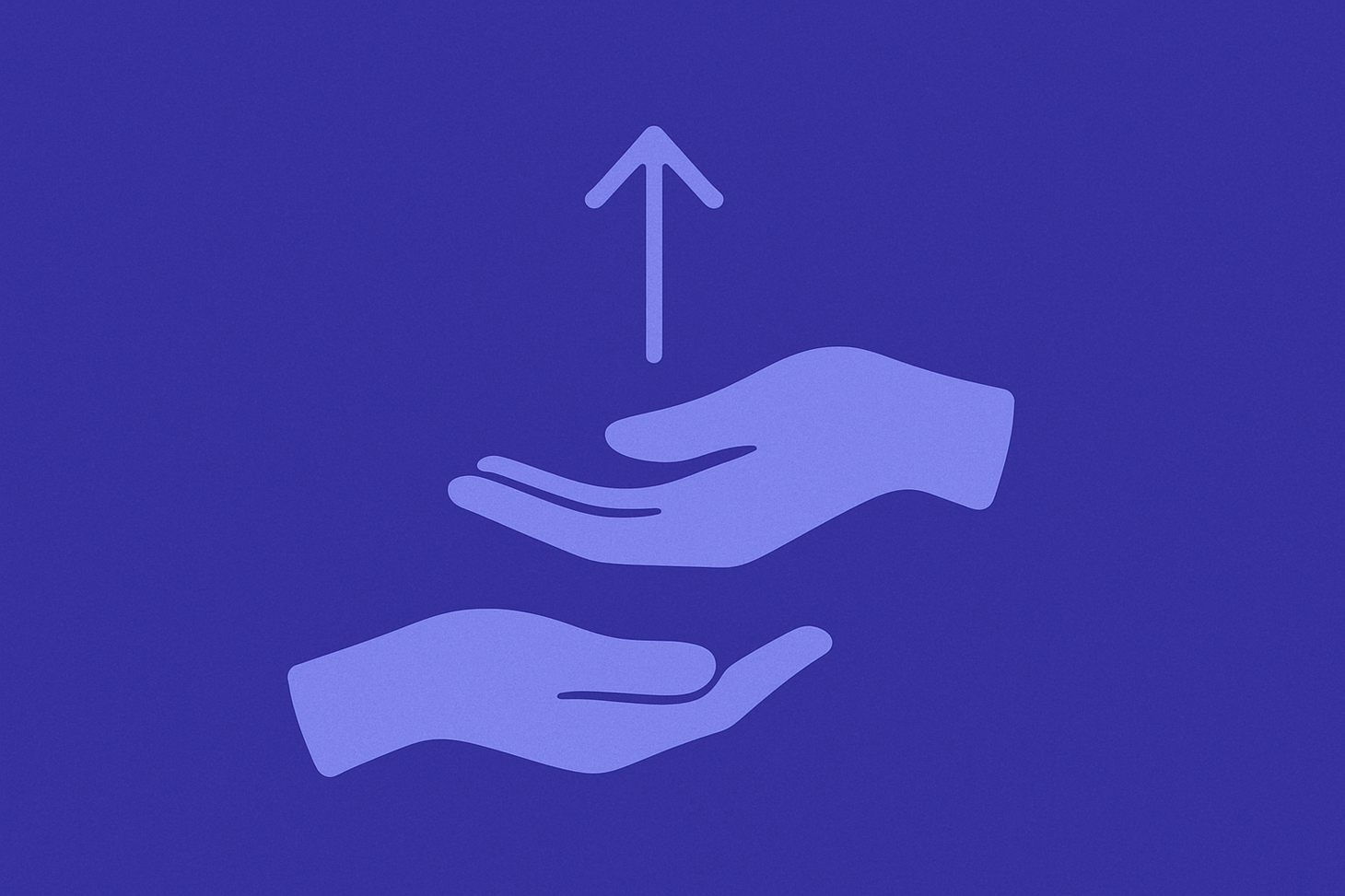On Higher Powers and Letting Go of Control
As leaders, we carry the weight of the world. What shifts if we surrender control to a higher power — something bigger than ourselves?

Looking for some support? If now is the time to consider coaching, reach out here.
I recently finished Elizabeth Gilbert’s new book All The Way to the River. Those of you reading who do not know her work may nonetheless remember her as the author of Eat Pray Love — the part memoir, part self-help book that followed her decision to blow up her domestic life and travel the world in search of personal revival and spiritual fulfillment.
I wasn’t a huge fan of Eat Pray Love when I read it years ago. In my early 20s, I was certainly not the target audience. But I did love her ode to creative endeavors Big Magic and still recommend it to anyone who wrestles with the what and how of creating something from nothing.
Given the backdrop of those two books, I had placed Elizabeth on a pedestal as someone who had life, creativity, and success all figured out. You can imagine my surprise when I ran across the New York Times review of All the Way to the River and learned that in the book she confesses to plotting the murder of her partner and to being a love and sex addict. I look up to any writer who dares to put their most personal truths on the page — so I bought the book on the spot.
There’s a lot to unpack in it, and the fact that I sense I’ll be doing so for months makes it, for me, a profound read. What I want to explore here is her story of finding support and solace in the 12-step fellowships. Reading about her experience, I found myself thinking: I need so much of that too!
Not necessarily because I see myself as an addict in need of support (though I’ve written separately about my experiment with giving up alcohol, my one drug of choice), but because some of the core tenets of the programs struck me as helpful to all of us — not only to addicts.
As a coach, I read most books with the lens of How might this be helpful to my clients? And while Elizabeth artfully describes the ideology of the 12 steps, I want to share and unpack the theme of a higher power.
Within the 12 steps, the following ideas appear:
- We came to believe that a Power greater than ourselves could restore us to sanity.
- We made a decision to turn our will and our lives over to the care of God as we understood Him.
- We sought through prayer and meditation to improve our conscious contact with God as we understand Him, praying only for knowledge of His will for us and the power to carry that out.
Friends of mine in the program have shared their stories too, and one thing is clear: these statements are not about any particular god or religion. The program doesn’t care if your higher power is the Christian God, Buddha, the Universe, nature, your inner guide, or anything else bigger than yourself.
The point is to drop the belief that you are the center of the universe.
That struck me deeply. And it felt resonant for me, for my clients, and perhaps for you too.
There was a time in my life when I was religious. At 16, I joined an evangelical Christian church. At 17, I attended one of the most prestigious Christian colleges in the world. By 24, I found myself sitting in church unable to shake the impression that the pastor was on stage judging a room full of people who were simply doing their best. I chose to leave the church and, with it, many of the friendships that had defined my early adulthood.
I don’t regret that choice. My life has been far richer for being open to different kinds of people with different backgrounds and beliefs.
But I can also see that I’ve suffered. Not because I no longer have the comforts of the Christian God to look up to, but because of an unacknowledged belief that I am now at the center. That I am the one in control. And when something in my life goes wrong, it’s all on me to fix it.
I hear a version of this suffering in the stories of most people who come to me curious about coaching. We often say people come to coaching when they realize that what got them here won’t get them where they want to go. Reading about the 12 steps, I was struck by how similar that realization is to the second part of the first step:
We admitted that our lives had become unmanageable.
My old coach Jerry once said on his podcast, “Nobody ever comes looking for coaching when things are going great.”
Some might hear that as weakness or failure. But the wiser perspective is that this is where real growth, impact, and leadership begin — in the awareness that the way I’ve always done things isn’t working anymore. And I cannot find the way forward alone.
That awareness is the starting point of true leadership, growth, and perhaps real adulthood.
Today I’m wondering about something bigger. About acknowledging a power greater than myself.
My experience with the church left me resistant to any higher power that smacks of religiosity or imposes one person’s understanding of the divine on another. But over the past few years, I’ve noticed that to live as though there’s nothing greater than me leaves me just as imprisoned as I felt sitting in that church pew two decades ago.
My own ego and need for control become the tyrant rather than the Bible-thumping pastor.
That resistance has also limited me as a coach. I’ve been honored to explore with clients the deepest questions one human can explore with another, but I’ve rarely asked about their views of a higher power. That feels like a mistake.
Because so many leaders I meet are suffering not from a lack of effort, but from the belief that they should be able to control everything around them. And it’s the should that creates the pain.
What if we begin by acknowledging that we don’t need to control everything? That life is unfolding in ways bigger than us?
The framing I’ve been holding for myself is:
What if I stop focusing on controlling and instead focus on contributing?
Looking back on my years as a CEO, I was at my worst when I tried to control people and circumstances. It never worked. I was at my best when I connected, inspired, and supported.
And I suffer most today when I cling to control — with my kids, my wife, or my clients. When I’m more attached to outcomes than to simply being present.
The point of acknowledging a higher power isn’t to absolve us of responsibility. In 12-step programs, responsibility is central. I’d suggest the same is true in our lives.
For me, I choose to believe that the universe is kind. That it is unfolding intentionally. That I am connected to that unfolding but don’t need to control it. And when I lean into that belief, I find myself more free.
That freedom makes me more able to meet my responsibilities: to contribute in my craft, to be a present husband and father, to be a good friend and son. To be — and in that being, to offer myself and my gifts to those I love and lead.
What about you?
I appreciate that you are here. If you’d like to get these posts in your inbox, you can subscribe here.
What if any power greater than yourself do you believe is at work in your life? What would shift for you if you relinquished the need to control your circumstances or those around you? What freedom might be waiting on the other side?
If you are up for sharing, I’d love to hear from you.
And if I can support you in some way on your journey, please reach out. I’m here.
With love, from LA.
Matt
Looking for some support? If now is the time to consider coaching, reach out here.
Sanity Notes Newsletter
Join the newsletter to receive semi-weekly updates in your inbox.


